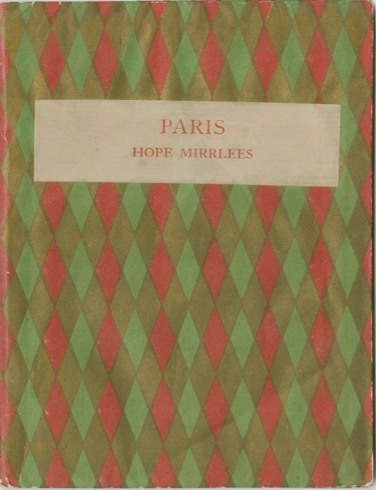Paris: A Poem was a product of Mirrlees’s life in the eponymous city in 1919, where she was studying Russian at the École des Langues Orientales, observing current events, and reading avant-garde poetry.[i] Contemporary reviews were mixed. The poem’s typographical play drew particular attention: “This little effusion” with its “tricks of type” seems meant “to give an ensemble of the sensations offered to a pilgrim through Paris. But it is certainly not a ‘Poem,’” wrote the anonymous reviewer in the Times Literary Supplement.[ii]The reviewer in The Athenaeum was more positive, explicitly linking Mirrlees’s work to “the idiom of the younger French poets,” including Blaise Cendrars and others known for typographical innovation. “‘Paris’ is immensely literary and immensely accomplished,” the review reads. “One reads it with pleasure and interest, admiring the author’s learning and wit, and the skill with which the verse is handled.”[iii]
The circuits of connection that led Virginia Woolf to publish Paris are unclear, but Julia Briggs speculates that the two met through Hope’s close college friend Karin Costelloe, who married Virginia’s younger brother Adrian Stephen in 1914.[iv] On August 8, 1918, Hope spent a weekend with the Woolfs and may have taken a manuscript of the poem with her to show Virginia. Shortly after, in a letter to a friend, Virginia wrote that Hope, “Jane Harrison’s favourite pupil, … has written a very obscure, indecent and brilliant poem, which we are going to print.”[v] Paris was only the fifth publication of the Hogarth Press, following T. S. Eliot’s Poems in March 1919. Briggs underscores that at the time, “Paris was the single most difficult task Woolf ever undertook as a printer.”[vi] The surviving proof pages of the manuscript show Mirrlees’s corrections and revisions, as well as minute instructions for adjusting the typesetting, including a request for “slightly larger spaces between the words.” The Hogarth Press printed an edition of 175 copies in 1920.
Briggs attributes the poem’s obscurity to the relative scarcity of copies in circulation. Mirrlees herself suppressed it later in her life: after the death of her close friend and mentor, Jane Harrison, Mirrlees converted to Roman Catholicism and refused to allow reprints of Paris on the grounds that it contained blasphemous passages. In 1973, she consented to its reprinting in the Virginia Woolf Quarterly, but cut several sections deemed offending, including the reference to “the cyclic Grand Guignol of Catholicism” where “Le petit Jésus fait pipi” (132-36) and the depiction of first communicants as “charming pygmy brides” (312). However, the journal folded a few years later, and the poem remained difficult to access.
Briggs played a pivotal role in recovering the text she called “modernism’s lost masterpiece”[vii]: the 1919 text of Paris, annotated by Briggs, was included in the 2007 anthology Gender in Modernism: New Geographies, Complex Intersections, edited by Bonnie Kime Scott. In 2011, an edition of Mirrlees’s Collected Poems edited by Sandeep Parmar was published by Carcanet Press; it includes Briggs’s commentary on Paris as well as several previously unpublished poems found in the Mirrlees Archive at Newnham College, Cambridge. In 2020, Faber released a centenary edition of Paris with Briggs’s annotations, and a conference to be hosted at the Sorbonne Nouvelle was scheduled for June. In addition to these academic projects, Pegana Press published a deluxe, hand-crafted edition of the poem in 2010, limited to 50 copies.
by Ann Marie Jakubowski
Further Reading and Bibliography:
https://peganapress.com/hope-mirrlees
https://www.carcanet.co.uk/cgi-bin/indexer?product=9781847770752
https://www.faber.co.uk/catalog/product/view/id/7585/s/9780571359936-paris/
Hurst Street Press facsimile edition of Paris?
British library: https://www.bl.uk/collection-items/paris-by-hope-mirrlees
Hope Mirrlees biography: https://www.poetryfoundation.org/poets/hope-mirrlees
[i]Briggs, Julia. “Mirrlees, (Helen) Hope (1887-1978), writer and poet.” Oxford Dictionary of National Biography. 23 Sep. 2004.
[ii] “New Books and Reprints.” The Times Literary Supplement, 955 (6 May 1920): 286.
[iii] “List of New Books.” The Athenaeum, 4699 (May 21, 1920), 686.
[iv] Briggs, Julia. “‘Modernism’s Lost Hope: Virginia Woolf, Hope Mirrlees, and the Printing of Paris.” In Reading Virginia Woolf: Edinburgh UP, 2006, 80.
[v] Woolf qtd. in Briggs “Modernism’s Lost Hope,” 81.
[vi] Briggs, “Modernism’s Lost Hope,” 83.
[vii] Briggs, Julia. “Hope Mirrlees and Continental Modernism.” In Gender In Modernism: New Geographies, Complex Intersections, edited by Bonnie Kime Scott. Champaign: University of Illinois Press, 2007, pp. 261-303.

